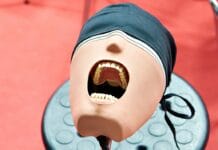Dental hygiene school. Three little words that bring with them so many emotions. For many, the days of dental hygiene school are but a distant memory which has long since passed. For me, dental hygiene school is very much present. I eat, sleep, and breathe dental hygiene. After waiting two years to finally receive that little white acceptance letter, I am finally pursuing an education that will prepare me for my future as an RDH.
What nobody told me, though, was that after how hard I had worked even to be accepted into the hygiene program, I would spend the first few weeks of dental hygiene school feeling defeated, overwhelmed, and inadequate.
My hope is to share my experience thus far with other dental hygiene students, or pre-dental hygiene students, who may feel lost in the new world of dental hygiene, as I did.
While you may feel like you won’t possibly make it through what lies ahead of you, please believe me when I tell you that you will. Further, you will be a stronger and more efficient hygienist because of the struggles you have faced.
The first weeks of class will be the worst.
You will be tossed into a whirlwind of new terminology, new classmates, new instruments, and new professors. You will wonder how in the world you are going to learn how to hold an instrument correctly, and find yourself pondering exactly where and how you fulcrum—in fact, isn’t fulcrum a swear word? The reading assignments will pile high within just the first few days. How do you already have a quiz on the second day of class?! You will often find yourself wondering why you need to know eruption dates and why you would ever need to be able to draw all 32 teeth. And seriously, is it not confusing enough to learn one numbering system for the dentition, let alone three? But please believe me when I say it will all make sense soon enough.
As if the didactic coursework wasn’t already making you wonder why you had to be cursed with a borderline obsessive love for teeth and all of their glory, you will also face your first experiences in a clinical setting. You will struggle to learn the seating positions for each area of the mouth and hit your head on your overhead lamp. You will go through the first awkward partner practice, where you get to explore another person’s oral cavity for what is likely the first time in your life. It will be awkward. You will not be good at instrumentation on the first try. You will accidentally poke your partner, and there will be blood. Some classmates may even faint. (Four classmates fainted the first week of my clinic, to be exact.) But please trust me when I say your skills will develop over time, and it won’t always be scary.
The first few weeks, which I now look back on longingly in the midst of finals, will be filled with many tears of frustration. But magically, as week four passes, then week five, and six, you will find yourself mastering your grasp, your fulcrum, and your adaptation. You will no longer feel the awkward tension when instrumenting on your partner. You will form connections with your professors and realize that they are there to support you, guide you, and help you reach your potential. You will learn to budget your time so that those reading assignments don’t pile up quite as quickly, and the exams aren’t nearly as intimidating if you study efficiently. That pesky overhead lamp will be at the perfect distance, no longer knocking you in the head, and you will know your operator positions without even thinking about it. You will look back on those first few weeks and smile because you have come so far already.
When you feel overwhelmed now, think back to week one.
You had no idea what a modified pen grasp was, and you struggled to “keep the terminal shank parallel to the long axis of the tooth.” Am I the only one who hears that about 300 times each clinic? Look at how much knowledge you have absorbed. Acknowledge how much your instrumentation has improved.
Dental hygiene school is much more rigorous than many people realize, and hygiene students need all the support they can get during this critical time of learning; that support starts with you. Be proud of yourself! Don’t beat yourself up when you get your first bad grade on an exam or when you don’t pass a clinical competency. Learning is all about struggling and making mistakes. By this time next year, your current worries will be long gone, and you will barely recognize the novice first-year hygiene student that you once were. Soak up the prophy paste, embrace the scrub life, and keep scaling on. Your days will get easier, you are not alone, and you are doing much better than you realize.
NOW READ: Kara RDH Shares Some Tips She Wishes She Knew in Hygiene School












